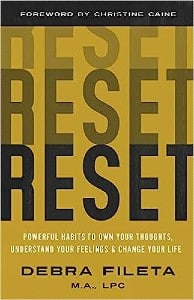John Fuller: Today on Focus on the Family with Jim Daly, we’re returning to one of our most popular programs. It aired a number of months ago in 2023, and we explored the topic of change and why that’s really hard to do sometimes. Maybe you can relate to these comments.
Woman #1: I have this bad habit of when I’m nervous, I talk a lot, like way too much.
Woman #2: I need to stop being so fidgety. I’m always messing with my hair and things like that, and it’s, um, a self-conscious thing.
Man #1: I wish that I procrastinated less.
Man #2: I tend to be late a lot because I try to cram everything into every minute of the day.
Woman #3: Sometimes, I tend to overthink things. I want to make sure I have all the details and then what they’re thinking and what I’m thinking. I just need to slow down and realize it’s gonna be okay and it’s gonna work out.
Man #3: I would like to be more courageous, especially in conflict, where I’m willing to speak up and say what I think.
Woman #4: I wish I could get over the habit of constantly hitting the snooze button.
John: Well, I think those sound like some good New Years resolutions, don’t you? Uh, our host is Focus president and author, Jim Daly, and I’m John Fuller.
Jim Daly: Uh, John, I don’t know about you, but I think change is a good thing. It’s not necessarily an easy thing.
John: Never easy, it seems.
Jim: And, you know, I think those resolutions every year to lose 20 pounds or go to the gym more often are kind of the ones that are overly used, but it can be a lot of different things that we want to change. Maybe reading the word every day, or as many days as possible. And then we get into it, and it just isn’t doable seemingly, and we give up too quickly.
John: Mm-hmm.
Jim: So today, we’re gonna talk about how to stick with it, how to reset and to do better, uh, as you try to change those things. Uh, maybe even the Lord is saying you need to change.
John: Yeah. And you mention resolutions. Uh, this is the time of year when I think most resolutions have failed, right?
Jim: (laughs).
John: (laughs) Right? And so there are some people that are fatalistic and they say, “Well, why even bother?”
Jim: That’s so true, but you know what, hang in there. Uh, I think the Lord wants us to change over time, right. That’s the whole process of what the Holy Spirit’s doing in our lives. Proverbs 1:5 says, “A wise man will hear and increase learning.” How about that one? Romans 12 talks about the renewal and transformation of our minds. And Galatians 5 describes the fruit of the Spirit, which I can remember a Christian leader once saying to me that, you know, he didn’t have any of that, and only a little bit of that. And I remember saying, “I don’t think it’s a restaurant menu that we order from.”
John: The gifts of the Spirit, right.
Jim: The gift and the fruit of the Spirit is present and available to you, and that’s love, joy, peace-
John: Mmm.
Jim: … goodness, kindness, mercy. And, uh, that’s what we need to be aiming for.
John: Yeah. And we’re gonna hear from a great guest who is featured in one of our best of 2023 programs, Debra Fileta. She’s a podcaster, a professional counselor, speaker and author, and Debra has a book called Reset: Powerful Habits to Own Your Thoughts, Understand Your Feelings and Change Your Life. We’ll tell you more about the book and other resources when you call 800, the letter A and the word family, 800-232-6459, or stop by focusonthefamily.com/broadcast. And now Jim, here’s how you began this best of conversation with Debra Fileta on today’s episode of Focus on the Family.
Jim: Debra, welcome back.
Debra Fileta: Thank you for having me.
Jim: Debra, we set that up. We talked about how change is good. Uh, do you think it’s good?
Debra: I think change is great.
Jim: (laughs).
Debra: I would actually be concerned if you couldn’t find something in your life that you wanted to change or grow or heal from.
John: Mmm.
Jim: Why do we get stuck then not wanting to change?
Debra: I think sometimes we do it the wrong way. We focus on external behaviors, behavior modification, instead of actually getting to the root. You know, maybe we’ll- we’ll go to the store and buy different ingredients or we’ll buy more books or we’ll eat fewer calories or we’ll get that gym membership, and I’m not saying those things aren’t important, but oftentimes, we start with the external rather than starting with the internal.
Jim: Yeah. Uh, Romans 7 is, uh, what we often point to when we don’t want to change, ’cause Paul himself said, “Those things I don’t want to do, I do, and the things I do want to do, I don’t do,” basically.
Debra: Yeah.
Jim: Uh, what- what was Paul dealing with?
Debra: Uh, so the interesting part about that verse is the first part, “For I do not understand my own actions.” And I think a big part of actually achieving change is understanding.
Jim: (laughs) That’s a good one. How do we take that inventory?
Debra: So, let me tell you-
Jim: (laughs).
Debra: … a little story to kind of help with this. When I was in college, I owned a lemon of a car. I mean, the crazy-
Jim: We all did in college.
John: Yeah.
Jim: (laughs).
Debra: I think you’re right.
John: We probably-
Debra: We probably all did, but mine was like super so-your of a lemon. I mean-
Jim: Okay.
Debra: … uh, when I would wake up in the morning and try to turn my car on, the craziest things would happen. The window wipers would just start wiping out of nowhere. The car-
Jim: Okay, that’s weird.
Debra: … the car alarm would start blaring.
Jim: (laughs) That’s weird.
Debra: And so one day, it’s finals morning. I remember, I have all these finals lined up. It’s December morning. It’s cold outside. I go to my car, and it won’t start. All of a sudden, the windows roll down and I pull the lock out of the lock cylinder, and the entire cylinder is on my key, so-
Jim: Out of your steering column like?
Debra: Uh, uh, the-
Jim: Uh, it was in the ignition?
Debra: … I- I- I put the lock in.
John: Yeah.
Debra: Uh, outside to try to get into my car.
Jim: Oh, the door.
Debra: The door.
Jim: Okay.
Debra: The cylinder all- falls out.
Jim: (laughs).
Debra: I mean, this car was crazy. So I had to drive to finals, I finally got the car started, in 19 degree weather with the windows down. Something was wrong with the car. And it’s funny because in that situation with this lemon of a car, I could have tried to duct tape the windows. I could have tried to muffle the alarm so it was a little quieter. But all of those things would be external changes. I needed to get to the root of what was actually happening. Why was this car a lemon? And I took it into the mechanic. It turns out, there was some wires crossed. A friend of mine had tried to fix it for me by installing a stereo system a few weeks before that.
Jim: (laughs).
Debra: And he crossed the wires. And so we had to get to the root in order for those external things to change. And this is the same thing that I tell people in my office as a licensed counselor. It’s not just about behavior modification from the outside. We have to get underneath the surface and figure out the roots and what’s going on from the inside if we really want to see change.
Jim: Yeah. So the m- moral of that story is don’t let your friends work on your car.
Debra: Yeah.
Jim: (laughs).
Debra: That’s definitely accurate.
Jim: But when you look at it, uh, I guess I’m always intrigued with change, uh, in that there seems to be a pain point, that when it gets too bad, then there’s more opportunity for that change to occur, but not always. Uh, it’s like that pain point can move, and you can apply that to anything, emotional, physical, you know. You’ve got to lose weight. You want to lose 50 pounds. And you start and you just don’t stick with it. I mean, how many gym memberships are oversold because of that? We always … You know, thankfully with my son Trent, he and I are at the gym pretty regularly now, and we have the two week January group. And being there five, six years now, I see that group come in and we always laugh.
Debra: Right. Right.
Jim: And then two, three weeks later, it’s back to normal. Same old people still coming. W- why is that happening with people? Why- why do we not implement change because it’s better for us?
Debra: You know, we’ve got to get to the point where the reward of change is greater than the reward of staying the same. So that work of going to the gym and having a healthy body is more of a reward than the reward of sitting at home and eating a tub of ice cream or watching Netflix for five hours straight. The reward of a healthy body becomes the reward. And so it takes time, I think for that to shift. And there’s also obstacles that keep that from happening.
Jim: In fact, in the book, you- you mention the noise that keeps our brains from really dialing in. What- what does that noise sound like? What does it look like?
Debra: You know, if you think about it, we live in a world where there is just so much noise. There’s constant data and information being drilled into our brains from commercials to podcasts to TV to, uh, our books. I mean, there’s just noise everywhere we go. And I think we get so accustomed to that, that we don’t realize the importance of stopping and pausing and being aware of what’s actually going on inside of us.
Jim: Yeah. Psalm 46:10, which says, “Be still and know that I’m God,” is critical in your book. You point to it as a core component. I- in this day and age, I mean, it’s so hard to do that, to be still. And then to take it to the next level, and know that He is God. How do you find that discipline? How do you do it to get quiet, to get centered, to remember that He’s God?
Debra: Well, I think that’s the key, is the word discipline. This is not something that’s gonna happen naturally. You’re not gonna find a moment to pause and stop and block out the noise. And in fact, I believe that the first step in change, and one I start the book with, is the discipline of pausing.
Jim: Hmmm.
Debra: And it is a discipline. It’s something you have to take the time to be intentional about, but it’s not just about pausing from the external noise. It’s actually also pausing from the internal noise. The, you know how sometimes we can be so self-critical and we can have negative thoughts, we can have ruminating thoughts? Stopping externally and internally to listen to the voice of God. You know, Jesus was really good at this. He took the time to pause and get away. He took the time to quiet His external world so that He could tune into His internal world. And I think we could learn a lot by applying that practice of pulling away and taking even 10 minutes a day to stop and take inventory of what’s going on inside of us.
Jim: You know, that can be really unsettling. I- I know of an experience that- that I had with the boys, where individual, I took them into the wilderness. It’s through a program, something we do called Adventures in Fatherhood. Uh, but they have you go out in the woods for three hours, and they give you 10 questions to kick off the conversation (laughs).
Debra: Mmm.
Jim: It can be very unsettling, I think especially for dads, as you’re sitting there with your 13, 14-year-old, and you try to go through three hours together with nothing to distract you. Speak to that discipline too, of when you’re getting quiet with the Lord, uh, especially with your family if they’re involved, ho- how do you concentrate and relax and not start thinking about everything at the office I’ve got to do and every other distraction? How do you really get quiet with the Lord and not think about all the other things?
Debra: I think this is a muscle that we have to develop, you know.
Jim: (laughs).
Debra: Going out into the woods for three hours is like asking someone to lift 400 pounds that’s never lifted before.
Jim: Right.
Debra: You know, you have to start small. And I think starting with 10 minutes at a time, um, is a really important thing, and be in tune of what are the intrusive thoughts that keep popping into my head, or what are the- the external things? Maybe my phone keeps dinging or buzzing in my pocket and is distracting me, or, uh, maybe the TV in the background and I need to turn that off. And just really take the discipline to tune out what’s going on outside of you, what’s going on inside of you, so that you can be focused on what God might want to say.
One of my favorite passages in the book of Job is when God says to him, “Pause for a moment and listen.”
Jim: (laughs).
Debra: Like Job, stop. A- and when you look at the original language, it’s not a suggestion. It’s a strong command, like you need to stop, so that you can listen.
Jim: Mm-hmm.
Debra: It’s the pre-requisite for change. It’s not a suggestion. It’s actually the work of change begins in pausing, because it gives our nervous system a chance to actually reset and recalibrate and tune into what’s happening on the inside.
Jim: It’s, uh, probably the first, maybe second step in recognition, correct? I mean, you’ve got to stop and think about what’s being said, what’s being done, how you’re acting, how you’re reacting. That’s part of it.
Debra: Right. That’s a huge part of it.
Jim: (laughs) It’s a huge part of it.
Debra: So it’s not even, because when people want to change, it’s like, okay, what’s the first step? Well, the first step is to pause.
Jim: (laughs) Yeah.
Debra: It’s like, I’m ready to go. But sometimes you have to stop intentionally so that you can go. And when you go, you do it well.
Jim: It might be the most difficult step in all of it as you-
Debra: I think so.
Jim: … as you go through it. Yeah.
Debra: In our culture today, it really is. I mean, the discipline of solitude is something that’s really been lost.
Jim: I found this pretty funny. You, uh, describe a social experiment where people are asked to rate themselves on a scale compared to their peers when it comes to their healthiness, I think. You can re-describe that. Uh, what did the study reveal about the way that we perceive ourselves and others?
Debra: So it was called the better than average effect.
Jim: (laughs).
Debra: You’re not as healthy as you think you are, and- and I have proof. The better than average effect is proof. They took a group of people and they asked them questions. They asked them to rate themselves on a scale of things like kindness and morality, even how well of a driver they were. And more often than not, the average person responded that they were better than average. “I’m better than my peers. I’m better than everybody else.” But mathematically speaking, not everybody can be better than average.
John: Mm-hmm.
Debra: Someone’s got to fall below the mean.
Jim: (laughs).
Debra: So we had an unrealistic perception of ourselves. They thought, well maybe this is just, you know, the people that we pulled, so let’s take this better than average effect to the prisons and see, what do prisoners think. Even in the prisons, people thought they were better than average of their peers.
Jim: Yeah, better than the other guy.
Debra: Better than everybody else.
Jim: Yeah.
Debra: And I think there’s something to be said of that. I think oftentimes, we do think we’re doing better than we are, and it inhibits our desire for growth and change and healing.
Jim: Well, I could see that. Uh, how do you do that? Let’s not just rush by this. I mean, how do you end up ascertaining and more realistic review of who you are and what you’re about?
Debra: Well, the fact that you’re listening to this program and watching us here today, I think that is a really important first step, because it shows that you’re downloading new information of, wait a second, I might not be as healthy as I think I am, and wait a second, I might have a biased perspective of myself. What can I begin to do about that? So even that knowledge, I believe, begins to open our eyes to the work that needs to be done.
Jim: I’m smiling because there c- there’s a difference between saying I’m an eight, but I’m gonna knock that back to a five, so I hear Debra, but not knowing why you went from an eight to a five. Just saying, okay.
Debra: Right.
Jim: In order to- to meet the test requirement-
Debra: Right.
Jim: … I’ll knock it back to average. But how do you really do the due diligence, the digging deeper through that solitude that you’re talking about to say, Lord, show me where I’m not as good as I think I am? And- and what’s the goal there?
Debra: Another powerful practice that I think we need to apply is called owning your junk. And here’s what I mean by that. Uh, you need to have an objective perspective of who you are. I call it outside in perspective. Imagine yourself in a movie and you’re the main character, and watch how you interact with people. Watch people’s reactions of you. Watch your tone, your volume, your body language as you’re speaking. These are the ways that you start to observe who you are and how you’re actually interacting with the people around you. How healthy am I? If my life were on camera display 24 hours, what parts of that movie would I start to feel a little embarrassed by and feel the need for change? We need to practice having that outside in perspective because we’re so wired to think of life from the internal perspective of, well this is who I am and this is what I do and everybody else is wrong. But take a moment to have that outside in objective perspective and see what you learn.
Jim: Wow, that’s good.
John: This is Focus on the Family with Jim Daly, and our guest today is Debra Fileta. We’re talking about, uh, some of the concepts in her book about change. It’s called Reset, and we’d encourage you to get a copy of that from us here, uh, at focusonthefamily.com/broadcast or call 800, the letter A, and the word FAMILY.
Jim: You know Debra, I’m thinking about an- a practical application of that. Your husband John is a big guy, and, uh, I can remember when Jean, and Jean was really good at pointing this out to me when our boys were smaller. You know, if I was on the emotional rise with something that I was displeased with, um, she’d say, “You know, you’re kind of a big guy, and I think the boys, you’ve got to be careful, because when your voice is going up, I think you’re freaking them out a little bit.” (laughs).
Debra: Mm-hmm.
Jim: Even that observation, because you know, playing sports, and that’s kind of what you do. You- you-
Debra: Right.
Jim: … get bigger-
John: Mm-hmm.
Jim: … to address the problem. And I think for, especially for dads that are, you know, of good size, you’ve got to be careful with your children, ’cause they, you know, it’s almost like you’ve got to get down at their eye level so you don’t scare them.
Debra: Yeah. I love that Jean loved you enough to give you that feedback.
Jim: Yeah.
Debra: Because sometimes we need people to speak into our lives and show up our blind spots. Do you have people speaking into your life? Have you invited people to speak into your life? Maybe you’re listening and you’re like, ah, I guess I- I don’t really have people who are helping me. Uh, you know, find people and ask them to give you that outside in perspective, because a huge part of change is taking ownership and acknowledging what we need to change. A huge part of it is what scripture refers to as confession. Confess your sins and struggles to one another so that you can be healed. I don’t think that necessarily means just our sin. I think it can also refer to any area where we want to heal and grow. It has to start with acknowledging and confession.
Jim: And let me, e- I mean, some of the difficult there too, there’s some obvious ones like that one. Then other ones where she’s tried to give me some insight, I haven’t responded that well to. So I mean (laughs)-
Debra: Yeah.
Jim: … you know, that’s the hard part.
Debra: It is.
Jim: Like, hey, wait a minute, you’re not seeing it correctly.
Debra: Right.
Jim: Uh, she may still be absolutely 100% correct but I’m not as open to that correction. So ho- how do we also emotionally come to that point where when it’s even a harder thing-
Debra: Yeah.
Jim: … and you’re going, wait a minute, we need to debate this?
Debra: I think it starts with what we tell ourselves about the feedback that we’re getting. If I’m telling myself my spouse or my friend is just offering me feedback because they want to squash me down and make me feel bad, of course we’re gonna react. But if we can tell ourselves, my friend or my spouse is offering me feedback to make me a better person, to make our relationship better and stronger, you interpret it a little bit differently depending on what you’re telling yourself about the feedback.
Jim: Right. Right. You, in fact, in the book mention this isn’t a one player game-
Debra: Right.
Jim: … called life.
Debra: Right.
Jim: And you point to the fact that people typically are wide open to helping you if you invite them.
Debra: Right.
Jim: (laughs) And now-
Debra: If you invite them is the key word.
Jim: … you have a difficulty … Yeah, that’s key, but, um, w- what keeps us from that invitation to others to speak to us, fear? I mean, I, there’s a handful that come to my mind. You’re the expert. What keeps us from saying, “Hey Debra, if you see something in my life, why don’t you let me know?”
Debra: Yeah. I took a poll on Instagram once, asking people, what keeps you from asking for help? They said things like fear of rejection or fear of being exposed or looking weak, fear of disappointment and trusting other people, and I’m not sure if they’re gonna come through for me. But if you continue to listen, you’ll hear, I say fear of, fear of, fear of because the key word there is fear. Fear keeps us from asking help and getting the support that we need. But it’s not a one player game. In order to change, you have to be humble enough to realize that it takes a community, it takes the people that God has put in your life, it takes your openness and honesty to be able to share, hey, I’m struggling in this area and I need your help to get to a better place.
Jim: Let me ask you this question, being a counselor. Um, when the scripture talks about fear not, and you see so many of these exchanges starting with fear, um, I would assume that our relationship with the Lord is inhibited in the same way, that we’re, if we’re unwilling to go to somebody that is close to us to say, “Can you help me better see my imperfection,” how are we not doing that with the Lord too?
Debra: Right.
Jim: (laughs).
Debra: Because- because, you know, how we interpret how the Lord views us, maybe we look at the Lord and we think He’s looking down on us with shame and anger and disappointment.
Jim: Right.
Debra: And if those are the narratives playing through our mind, we’re definitely not gonna go to Him for help. But if we realize He wants me to become better, He has a plan for me that is so much better than anything I could ask or imagine, He has my good in mind, He has my best in mind. I mean, that begins to change the view that we have of God and our willingness to go to Him.
Jim: Yeah. In- in fact, you talk about it as an act of faith, um, to go to the Lord, and- and I’m sure even to others, to help, uh, make us better. How- how is it an act of faith to do that?
Debra: You know, the Bible says that when you ask, it will be given to you. And I do think there is an act of faith there, and maybe overcoming our feelings, doing what we don’t necessarily want to do, which is being vulnerable, but there’s a reward at the end. When you ask, you will receive. When you knock, the door will be opened. When you seek, you will find. But it takes that willingness, and I think moving forward in faith means that we don’t allow our feelings to dictate our behavior.
Jim: Mmm.
Debra: And we move forward into becoming better people.
Jim: And I think too, especially in that marriage category, the gentle answer is so critical. Um, sometimes in marital strife, that can be really hard because it’s already, uh, kind of the teapot’s already boiling. So if you’re attempting to say, “Honey, help me see some things I can’t see,” and she goes, “Oh, I’ve got a list of 20,” and we start hitting them, you can get really defensive in that way. Ho- how do you coach a couple to help one another, um, without hurting each other in the process?
Debra: Well, one thing I encourage couples to do on a regular basis is take inventory of their bank account, because giving someone feedback and telling them that they need to change in an area is like making a withdrawal from a bank account.
Jim: (laughs).
Debra: It’s an important thing. You know, we’ve got to make the withdrawal and pay for some things, but it’s a withdrawal. And so you balance that out with a lot of deposits, affirmation, love, affection, kindness, gentleness, so that when the time comes for those important necessary withdrawals, it’s easier on everyone.
John: Mm-hmm.
Jim: Yeah. The, uh, the idea of, uh, allowing somebody to speak into your life like that actually, uh, does help value them, correct?
Debra: Yeah, absolutely. It helps value that person because you’re taking their words seriously. You’re trusting them. And this is something that I think we need to address. It’s not just anybody. You don’t just take feedback from anybody. You don’t just ask anyone for help. I think it’s important who you ask.
Jim: Mm-hmm.
Debra: And to make sure it’s people that- that you can trust and people who have your best interest in mind, and people who really care about helping you become a better person. If you think about your life right now and you don’t have a few core people like that in your life, I think it’s time to ask God to reveal some of those people and be intentional about getting people like that in your life to help you along the journey of becoming better.
John: What a great perspective from our guest, Debra Fileta, on this Best of 2023 episode of Focus on the Family. And Jim, it’s pretty obvious why this program was so popular with our listeners and viewers. Debra was really challenging us to evaluate ourselves and others in more Godly ways.
Jim: That’s right, John. And I believe we all need to do a self-assessment to figure out what’s working well in our lives and where we need to make those improvements. It’s such a simple formula, but it’s one of the most difficult things for human beings to do, right. When we’re willing to acknowledge our mistakes and areas of weakness, then we can grow because we know where we’re going from and what we’re going to.
John: Mm-hmm.
Jim: You know, Psalm 139 says, “Search me, oh God, and know my heart. Try me and know my thoughts, and see if there be any grievous way in me, and lead me in the way everlasting.” That’s what we’re trying to do here at Focus on the Family, not just for you, but all of us on staff here.
John: Mm-hmm.
Jim: We’re all moving hopefully in a more Godly direction over the arc of time. And that’s why we produce programs like this one and provide resources like Debra’s great book, Reset: Powerful Habits to Own Your Thoughts, Understand Your Feelings and Change Your Life. It’s my hope here at the beginning of the new year that you will join Focus on the Family in ministry to help others along the same path. Your monthly giving will equip us to respond to an estimated three quarters of a million people who will contact us over the next 12 months for spiritual discipleship and support. And working together with the Lord’s help obviously, we can transform these lives. So please, consider a monthly pledge today, or a one-time gift if that’s all you can afford right now. And let me say in advance, thank you.
John: And we certainly look forward to hearing from you when you call 800-232-6459. Uh, that’s 800, the letter A, and the word FAMILY, or you can donate at focusonthefamily.com/broadcast. And when you make that monthly pledge or one-time gift of any amount, we’ll send a copy of Debra’s book, Reset. It’s our way of saying thank you for joining the support team.
Jim: And John, there are people listening right now who feel like change is impossible. They know certain habits and attitudes are holding them back, maybe even creating a barrier between them and the Lord. If that describes you, we want to help. We have a team of caring Christian counselors who want to talk with you, hear your story, and give you the Godly advice you need. Uh, let us play that role. Let us help you get out of that rut and onto the path of healing.
John: And once again, our number is 800, the letter A, and the word FAMILY, or look for the find a counselor link at our website, and that’s focusonthefamily.com/broadcast. Well, thanks for joining us for this best of edition of Focus on the Family. We’ll have more of our conversation with Debra Fileta next time, and hope you can join us then. And on behalf of Jim Daly and the entire team, I’m John Fuller, inviting you back then, as we once more help you and your family thrive in Christ.




















